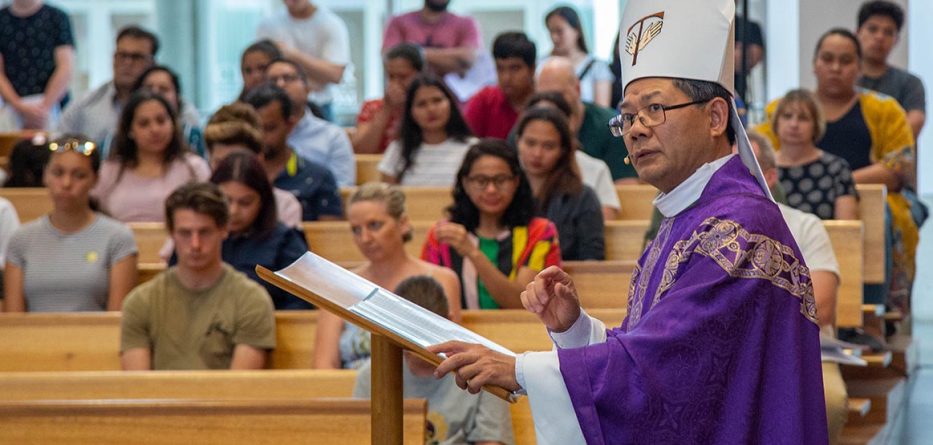Most Reverend Vincent Long Van Nguyen OFM Conv DD STL, Bishop of Parramatta
Homily for the Fourth Sunday of Advent
Readings: Micah 5:1-4; Hebrews 10:5-10; Luke 1:39-44
Dear friends in Christ,
This week, the whole of Australia has been shaken by the jumping castle tragedy in Tasmania. The deaths of five young children and the injuries of the innocent left us with profound grief. We are united with their loved ones who suffer unimaginable pain. The outpouring of love and support is an indication that we are all connected in our vulnerability.
Today’s Scripture highlights one of the core tenets of our faith that God reveals himself in the peripheries of life. He comes among us not brandishing his power and status. Rather he chooses to immerse himself with our vulnerability by living fully our human condition among the most marginalised of society.
As God breaks ranks and becomes vulnerable for us, so must we have the courage to leave our comfort zones and discover the presence, the beauty, the love of God in unfamiliar places, in the margins and the shadows of life. We cannot worship the Christ Child in truth without honouring him in the needy, the poor and the marginalised.
In the first reading, the prophet Micah speaks of the coming of the new ruler of Israel who will defy the conventional expectations. He will follow neither the pattern of the Jewish elites nor the way of the imperial rulers who use their power and wealth to exploit the poor. Micah denounces them for being preoccupied with their influence and affluence instead of seeking justice for the poor. Against their arrogance and self-centred ambition, he issues a warning that God would take up the cause of with the weak and the vulnerable.
In fact, Micah is the first prophet to identify the Messiah with Bethlehem, the place of insignificance as opposed to Jerusalem, the capital of wealth and power. This metaphor is both an indictment of the comfortable rich and a vindication of the afflicted poor. In the midst of the wheeling and dealing where everyone looks after his own interests, the prophet comforts the exploited masses and summons the Israelites to their true calling. This summons has become one of the most inspiring passages of the whole Bible. “The Lord requires of you only this: to act justly, to love tenderly and to walk humbly with our God.”
Micah’s prophecy reminds us that when all is said and done, we must be faithful to the God who is not so much worshipped with elaborate ceremonies in Jerusalem as identified with the powerless in Bethlehem; the God who is not so much appeased with sacrifices of the rich as indignant at the injustice done against the poor. The letter to the Hebrews reiterates this fundamental insight. God takes pleasure not in sacrifices but in the doing of his will.
We cannot underestimate this prophetic insight. The whole Judeo-Christian enterprise is pivoted to the imitation of the God who listens to the cry of the poor. Hence, a Christianity that does not serve the needy, that does not accompany the excluded, that sidesteps the plight of the marginalised, that gives no hope to the estranged cannot be true to its roots.
The Gospel offers us another perspective into the God of justice, compassion and solidarity. Whereas Micah condemns the movers and shakers in Jerusalem and Samaria for their self-centredness, the Gospel gives us a positive model of living for others. Mary of Nazareth is the antithesis of indifference and apathy. She refuses to settle comfortably in her status. Instead, she lives out her missionary discipleship by accepting inconvenience and risk. She goes out of her security in order to accompany and share the Good News with others. Mary is therefore a model for us Christians individually and collectively in not hiding behind the shield of our security but in going out to the periphery and in being in solidarity with others. She embodies the God who raises up the lowly.
Brothers and sisters, we are at the threshold of Christmas which is the mystery of God identifying with us in all our human vulnerabilities. The liturgy today invites us to prepare for the feast of God who becomes small and dependent on the little ones of history. Both Mary and Elizabeth represent the best of the “anawim”, that is, the poor faithful remnant through whom God’s plan came to fruition. Their Yes to God and daily pursuit of God’s justice against all the odds that made them the heroines of the Gospel.
We are called to follow the footsteps of the anawim like Mary and Elizabeth. It is in embracing the trials and tribulations of life rather than in safeguarding our status and privilege. It is in following the pattern of the self-emptying Messiah who chose vulnerability rather than power, poverty rather than prosperity, accompaniment at the coalface rather than privileged seat at the temple. Doing so, may we embody the God who raises up the lowly and heals the broken hearted.








